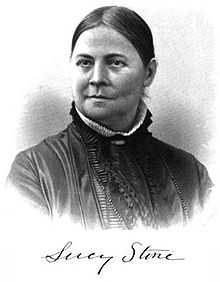Visit the Homesite of Lucy Stone
View the program, photographs, and memorabilia for the Bicentennial Celebration in 2018
Read The Ballad of Lucy Stone by Linda King Brown, a Stone descendant
Lucy Stone was born in a farmhouse on Coy Hill Road, West Brookfield, on the 13th of August 1818. She grew up at a time when women were without most legal rights. Women also lacked civil rights, and most personal rights were exercised at the consent of a male “head of family”. Inheriting a rebellious nature from her grandfather, a leader in Shays’ Rebellion, Lucy spent her adult life promoting equal rights and full justice for all. In an age when higher education for women was considered an “unnecessary waste”, Lucy worked and saved for seven years to pay her own way through college. She campaigned for woman’s rights, often before a hostile and sometimes unruly audience, usually winning at least a grudging admiration for her eloquence and her courage. Lucy died in 1893 at the age of 75. Her last public speech urging women “to labor unceasingly” for equal rights was given six months before her death. Although the Stone Family farmhouse has been destroyed by fire, the Quaboag Historical Society has installed a stone marker and a large informational sign at the site. The West Brookfield Historical Commission invites you to visit it and spend a few minutes honoring this courageous 19th-century woman.
In 1843 – Entered Oberlin College and became active in the abolitionist Anti-Slavery Society. In 1847 – The first Massachusetts woman to graduate from College. In 1850 – Organized the first Woman’s Rights Convention In 1855 – Married Henry Blackwell keeping custody of her own name. In 1869 – An organizer of the American Woman’s Suffrage Association. In 1870 – Founded “The Woman’s Journal”, the foremost Suffrage Newspaper of the time.
Lucy Stone’s world before 1840 –
A husband had a legal right to beat his wife “with a reasonable instrument” in most states. The exception was Massachusetts, whose General Court adopted a law against it in the late 1600s. All married women’s property and earnings belonged to the husband. The husband had sole control of the children and could legally make his will to give them to strangers, refusing the mother any custody rights. A wife could not make a contract, sue, or make a valid will without her husband’s consent. Women were not allowed to speak in public, or to write for any publication. No college or university admitted women. There were no women’s organizations, except for small groups of women who met at church sewing circles. Directions:
From West Brookfield library heading west on Route 9, it is 2.8 miles to Coy Hill Road on the left. From Ware library heading east on Route 9, it is 3.5 miles on the right. The home site is 0.3 miles up Coy Hill Road on the right.
